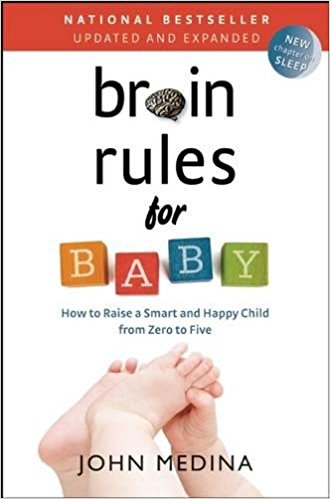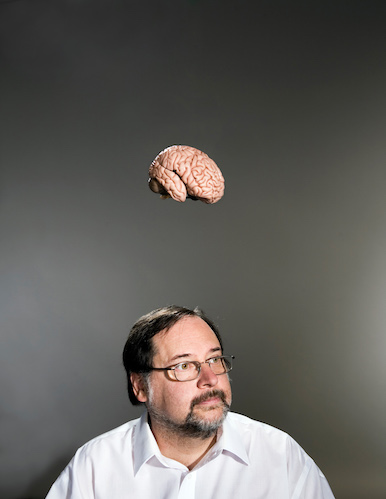Go-To Book
To Raise A Happy And Smart Child, Read Brain Rules

Neha Kirpal
July 20, 2018
With the plethora of parenting advice and literature on the Internet, new parents are often confused about what to follow and what to discard. Like all new parents, I lapped up all the available information in the form of numerous BabyCenter columns, parenting blogs and mommy discussion forums. However, some of the best books on parenting I have read in the past year of being a parent were handed down to me from a well-meaning young parent herself—my elder sister—and the knowledge I have gained from them has been nothing short of priceless.
(Artwork by Nimisha Todi)
One of these was Brain Rules For Baby: How To Raise A Smart And Happy Child From Zero To Five by Dr. John Medina—a gem of a book for all new parents. A developmental molecular biologist and research consultant, Dr Medina is the author of the long-running New York Times bestseller Brain Rules: 12 Principles For Surviving And Thriving At Work, Home, And School. The book is aimed at a huge population of couples obsessed with the idea of “genius babies” who grow up to sail through all the coveted Ivy League colleges (read Harvards—or IITs and IIMs, in Indian parlance).
While busting several myths that parents believe will help boost their child’s brain development—such as playing Mozart to one’s womb—the book discusses various concepts, behaviours and activities that can indeed help increase a child’s brain power. Throughout the book, there are first-person accounts of his own parenting experiences, those of parents who have taken his advice, as well as stories posted on the parenting website TruuConfessions.com (Editor’s Note: This website is no longer active).
The words ‘Seed’ and ‘Soil’ are used in the chapter names, corresponding respectively to ‘nature’ and ‘nurture’, as the book seeks to explain how all children are different individuals by virtue of their genes and the environment they grow up in—and yet, what parents can do to influence their inherent nature with the help of the right nurture.
Babies develop an active mental life in the womb.
Brain Rules begins with a chapter on pregnancy that talks about what expecting parents can do for their child’s brain development even before they are born. It covers important aspects at this stage, including a balanced diet, moderate exercise and enough rest. It also explains why expecting mothers should avoid stress and minimise the use of gadgets.
The brain cares about survival before learning.
The ‘Relationship’ chapter in Brain Rules is my absolute favourite—as it personally gave me lots of useful insights and learnings. Medina’s main premise is that the brain seeks safety above all other things. A baby’s first point of contact in the world is its parents—and naturally, they provide the baby with its most crucial need for security. So, when parents are stressed out or fight with one another (according to Medina, couples’ hostile interactions sharply increase in the baby’s first year due to reasons such as sleep loss, social isolation, unequal workload, and depression), a baby feels insecure and upset. For this, Medina advises new parents to increase their social interactions with friends and share the parenting workload equally as far as possible.
According to Medina, sustained exposure to such hostility can dramatically erode a baby’s I.Q. and ability to handle stress. Such babies can even develop further problems related to attention and regulating their emotions. Moreover, infants are extremely observant, absorb and imitate behaviour around them even when they are a few weeks old (“monkey see, monkey do”). Parents often overlook this fact, thinking that their offspring have no idea what they are saying or doing. I can bet that just reading this can be a huge learning for any new parents!
Medina also adds that, unfortunately, parents often fight in front of their children, but reconcile in private. This leads to children seeing the “wounding” but never the “bandaging”. For this reason, he advises that if couples do happen to fight in front of their children, they should also make up in front of them.
(Image credit: Brain Rules)
Intelligence is not developed in the crucibles of machines but in the arms of warm, loving people.
Medina is a strong believer in empathy or emotional intelligence. He talks about how critical it is to acknowledge and name a child’s emotions, and not judge them. He also provides a powerful practice known as the “empathy reflex” or choosing to empathise. According to him, it can change the developing nervous systems of children whose parents regularly practice it. Rather than simply reacting to one’s impulse (often in a state of anger or irritation), couples too can practice empathy with one another—by detecting each other’s emotional changes, trying on the perceived feelings for themselves, and observing how they would react given similar circumstances.
In Brain Rules, he illustrates the empathy reflex well with the help of a mother whose teenage daughter returns home beyond her curfew hour. Not only does the mother not scold her for coming late, but also guesses that something is wrong by the scared look on her daughter’s face. Rather than being an instance of emotional smackdown, it turns out to be a moment of understanding between mother and daughter with both hugging and crying in each other’s arms.
Executive function is actually a better predictor of academic success than I.Q.
Medina goes on to talk about popular I.Q. tests—such as the Wechsler Intelligence Scale for Children, version IV—along with some of the questions typically posed to the test-takers, concluding that a one-size-fits-all notion may not really be the final word on a baby’s brain power. Further, he says that I.Q. is not stagnant, and is changeable—based on factors like one’s environmental influences, family, economic circumstances, etc.—over a period of time. He argues that a child’s intelligence is composed of several other crucial ingredients, such as the desire to explore, self-control, creativity, verbal communication and decoding non-verbal communication. Here, he talks about creativity tests, such as the Torrence Tests of Creative Thinking, which measure variables that most standard I.Q. tests miss out on.
(Image credit: Hindustan Times)
Chart your child’s emotional landscape.
According to Brain Rules, the essential ingredients to boost kids’ brainpower include breastfeeding for a year; talking to one’s baby (describing everything you see, reading together and verbalising one’s feelings); open-ended/guided play; and praising a child’s effort (“you worked really hard”), not intelligence (“you’re so smart”). He also emphasises the importance of face time (or facial expressions)—and not (phone or TV) screen time—for babies’ brain development. To discipline children, as they get older, he prescribes a set of clear, reasonable and consistent rules and rewards, and swift punishments.
Brain Rules has been an invaluable source of parenting knowledge for me—something I didn’t get from any of the other sources I have read in the journey so far—and I would highly recommend it to all new parents!
Have you read Brain Rules? What do you think of Medina’s thoughts on parenting? Share your thoughts with us.


Neha Kirpal
Neha Kirpal is a freelance writer based in Delhi. She is the author of Wanderlust for the Soul, an e-book collection of short stories based on travel in different parts of the world. All her published work can be accessed on her blog.







Check your inbox to confirm your subscription
We hate spam as much as you hate spoilers!